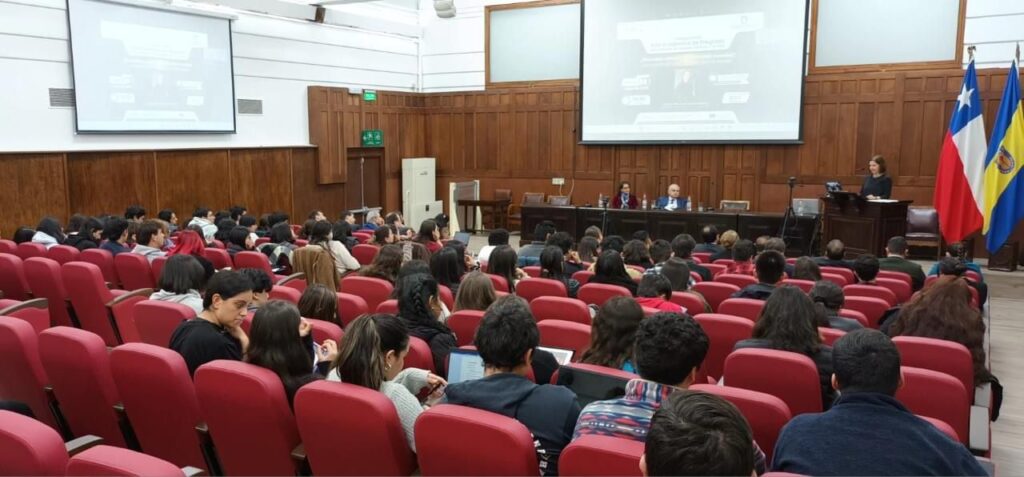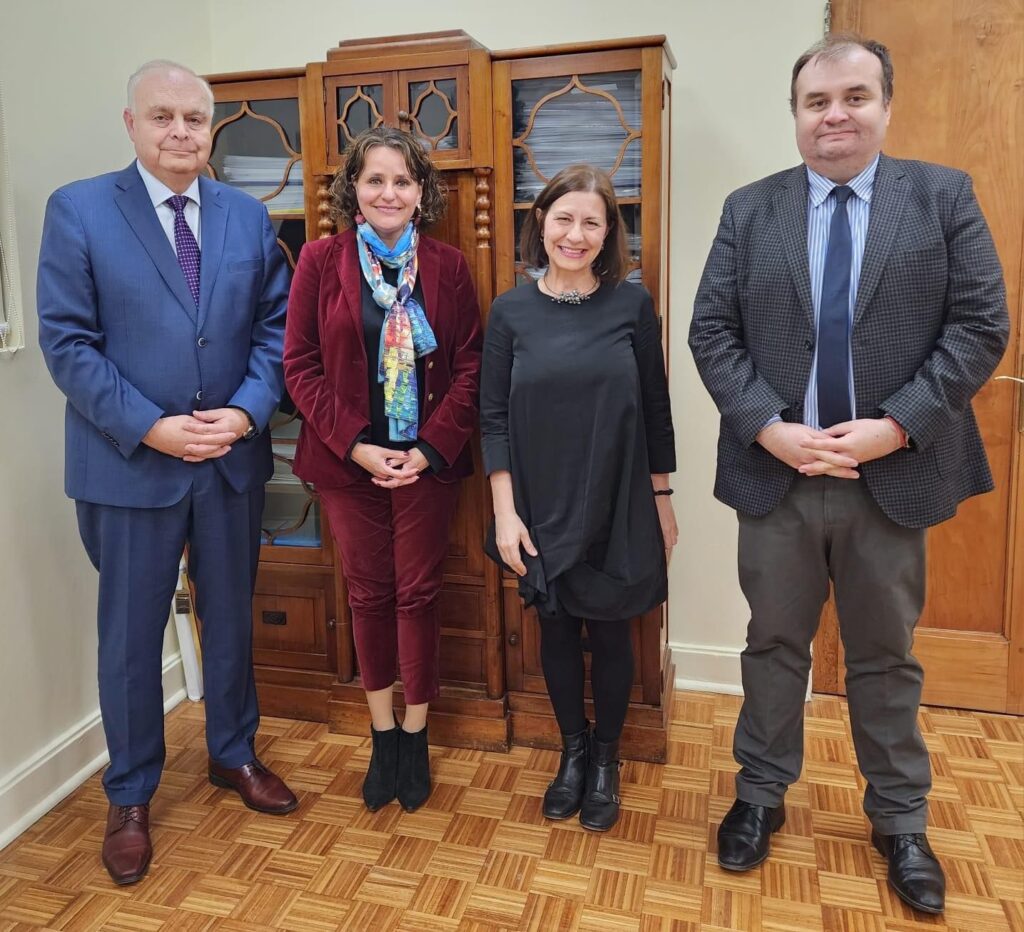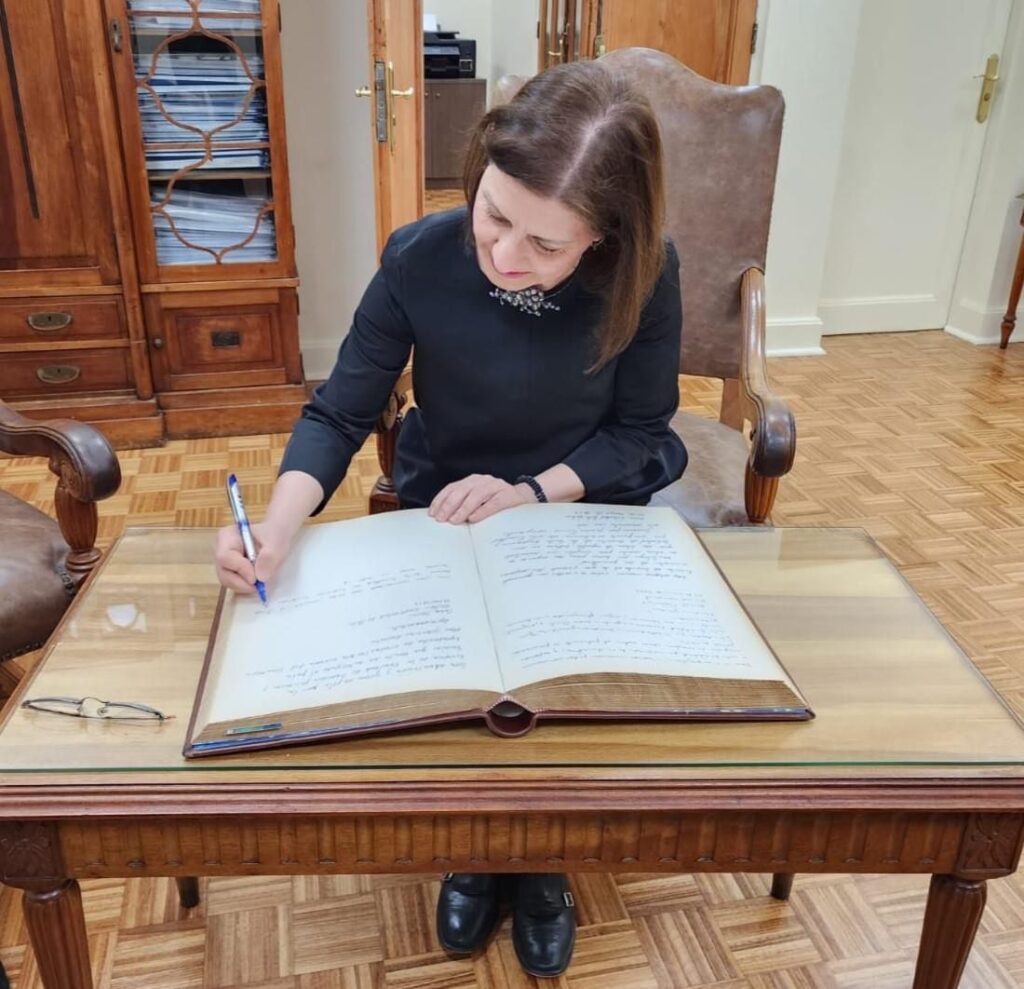Susana Sanz has been invited to Chile by Rodolfo Walter Díaz (Dean of the Faculty of Social and Legal Sciences) to give a master class at the beginning of the academic year at Universidad de Concepción

Our colleague Susana Sanz has had the privilege of giving a master class at the beginning of the course at the University of Concepción (Chile). The title of the lecture has been “European disorder or world disorder? The invasion of Ukraine as a case study” and has been divided into four parts:
1. Legal and political framing of the aggression against Ukraine
Dr. Sanz has described the invasion of Ukraine as a test of resilience for the world and European order, a test bench for the resistance of the Rule of Law. In this sense, she has referred to the United Nations Charter, according to which the use of force is forbidden in international relations except in two situations:
- In case of self-defense recognized in Art. 51 of the Charter.
- When the use of force is authorized by the United Nations in case of threat to the peace, breach of the peace or act of aggression under Chapter VII of the Charter.
Having established these premises, Sanz has focused her presentation on analyzing Russia’s land, sea and air invasion of Ukraine, an independent country since 1991.
First of all, she has stated that it consists of a war of conquest, and this “represents a drastic change with respect to the usual modus operandi in other former Soviet republics, such as Georgia or Moldova, in which Russia has based its strategy on hybrid threats, on generating very localized conflicts and then freezing them, or on waging covert wars.”
Regarding these covert wars, Sanz has highlighted the annexation of the Ukrainian peninsula of Crimea in 2014, in which Russia made use of the so-called “little green men“, which generated confusion because they were armed groups that did not identify themselves or were not uniformed as Russian troops, but as soon as they occupied Crimea they ceded control of the territory to Russia.
Our colleague has explained that in this line continued Russia, generating a low-intensity conflict in the Donbas area, specifically in Donetsk and Luhansk, a conflict that has lasted since 2015 and has degenerated into the current large-scale invasion.
In the face of these attacks, Ukrainian President Zelenski especially turned to the countries that claim to defend the Rule of Law to come out in defense of respect for International Law. As Susana Sanz has said, “we are risking the survival of the international law we have known up to now and also of a more democratic model of society to which we aspired.
Zelenski tells us that this war, in which there was no provocation by Ukraine, is more than a bilateral war; and that what happens there will determine the future of International Law and the Rule of Law.
And I agree with him, because we are living in turbulent times both for international law in general and for the rule of law in particular.”
“INTERNATIONAL LAW IS ABUSED, ESPECIALLY THROUGH SO-CALLED LAWFARE, I.E., THE MALICIOUS USE OF RULES TO ACHIEVE ILLEGITIMATE OBJECTIVES”
The problem of authoritarinism
According to Freedom House’s annual report, 38% of the world’s population lives in states that are not free, the highest rate since 1997. In this ranking, Russia appears as a country where there is no freedom, with an index of only 16 points out of 100. Dr. Sanz has explained that the decline of the Rule of Law leads to a rereading of International Law in an authoritarian key, to an international governance in which values such as democracy or human rights are no longer invoked.
In view of the current situation in which we find ourselves, our colleague has referred to the period immediately after the Cold War, at the beginning of the 1990s, when there was an atmosphere of optimism and a new, more balanced, multilateral, pluralistic, liberal and democratic international order.
She has mentioned the Millennium Declaration of the United Nations General Assembly, which in 2000 proudly alluded to democracy, the Rule of Law and good governance as new aspirational principles of the organization, and to the principle of the responsibility to protect, according to which there is a moral obligation to assist the population of a State when rulers commit genocide, war crimes or ethnic cleansing against their own fellow citizens.
The United Nations Security Council
This body is responsible for deciding on the use of force under the principle of the responsibility to protect, however, there have been abuses and this has served as a pretext for Russia to invoke this principle and justify its intervention in several ex-Soviet republics, claiming that it is doing so to protect the ethnically Russian minority which, it alleges, would constitute a vulnerable group and would be discriminated against.
The Euromaidan
Susana Sanz considers that the problems between Russia and Ukraine started before 2013 when these protests took place in Maidan Square. However, the problems were exacerbated by these demonstrations in which citizens demanded the signing of the free trade agreement that the European Union had proposed to the country. At the same time, at the Euromaidan, the population showed its rejection of the Kremlin’s proposal for Ukraine to sign a cooperation agreement with Russia.
According to Sanz, it was at that moment that Russia became wary because it realized that it no longer exercised the influence it thought it deserved over its former territory. It saw how Ukraine disavowed its common past and sought to distance itself from the Russian imperialist pattern; its main goal being to join the EU as a state under the Rule of Law and NATO as a military ally.
“RUSSIA IS NOT RIGHT IN THIS WAR. AT ALL. IT IS THE AGGRESSOR. AND IT IS A TEXTBOOK AGGRESSOR”
2. Russia’s arguments for the invasion
Our colleague has explained that Russia believed that the one in Ukraine would be a blitzkrieg, they thought that Zelenski was despised for his past as a comedian and that, therefore, they would overthrow him and his government and everyone would flee the country.
Moreover, they thought that the rest of the nations would accept as a fait accompli the puppet regime that Russia intended to install in Ukraine, just as it happened with the war over Transnistria in Moldova in 2006, or with the war over South Ossetia and Abkhazia in Georgia in 2008, or with the annexation of Crimea in 2014. In all these places the Kremlin first fueled the secessionist aspirations of the pro-Russian minority by organizing illegal and fraudulent referendums that would justify its subsequent intervention under the excuse of defending that minority.
However, Russia was wrong since that common past is remembered with horror by Ukrainians and because they see Putin’s revisionism as an existential threat.
In Dr. Sanz‘s words, “Putin is the one who is making Ukrainians Ukrainian, he is the one who is creating and rewriting an epic story for Ukraine of struggle against the tyrant, of iron resistance against the aggressor. Putin is the one who is building the legend of the weak people who are victims of the abuser, but who resist and fight back, a people of heroes. And that unites a lot.”
The invasion is less about control of Ukraine and more about Putin’s rivalry with the West, it is more about the interest in destabilizing international relations in favor of Russian interests.
“THE PROBLEM IS REALLY WITH THE FREE WORLD, WITH DEMOCRACY AND THE RULE OF LAW”
Ukrainians are a problem for Putin, they are people who have chosen the rule of law as a form of national identity in the face of neo-imperialist adventures.
3. Analysis of the international response to the conflict
Although international judicial mechanisms unfortunately leave much to be desired because their jurisdiction is voluntary, Ukraine has achieved a judicial victory using the same argument that Russia is using against it: Russia claims that it had to invade Ukraine because genocide was being perpetrated there against the pro-Russian population and Ukraine has sued Russia before the International Court of Justice for it to investigate and judge whether it is true that Ukraine has committed genocide.
In this regard, the International Court of Justice has accepted the provisional measures requested by Ukraine. This has been a major victory because, for the time being, it has already demanded Russia to immediately leave the invaded territory because there is not the slightest indication that Ukraine has committed genocide.
Susana Sanz points out that in a way the UN, through this Court, is carrying out the work that should be carried out by another of the organs of the international organization, the Security Council, which has the primary responsibility for the maintenance of peace and security.
The international response to the war has been practically unanimous. There are responses, individual and collective, unilateral and institutional, which show that this war should be a revulsive that unites the rest of the world against the aggressor:
I. There have been at least 2 historic UN General Assembly resolutions, one in 2022 and the second in 2023 categorically condemning the aggression and demanding that the invading troops withdraw.
II. The EU, the USA and many other states (more than 40 to be precise) are imposing harsh sanctions on Russia, which is an economic war.
III. Russia has been expelled from the UN Human Rights Council for the rights violations it is committing in Ukraine.
IV. That same Council decided to start an urgent and independent investigation into the abuses committed by Russia.
V. NATO has admitted Finland and hopefully soon Sweden.
VI. The EU has accepted Ukraine’s candidate status.
VII. The OSCE has launched an investigation into war crimes committed by Russia, including the forcible transfer of Ukrainian children.
VIII. The Council of Europe invited Russia to leave the organization to spare it the embarrassment of expulsion.
IX. The European Court of Human Rights has accepted several complaints against Russia.
X. The Chief Prosecutor of the International Criminal Court has launched an investigation into war crimes perpetrated in Ukraine and in a landmark decision, this Court has called for Putin’s arrest.
XI. The International Court of Justice in another landmark decision has demanded that Russia cease its aggression and withdraw from foreign territory.
What the international community has declined to do for the time being is to act on Ukraine’s request for military intervention in Ukraine because direct military intervention against Russia could trigger World War III. But what is being provided to Ukraine, and on a large scale, is weaponry, military training, training, intelligence, information, economic aid and refugee assistance.
“Russian atrocities pose a challenge to the international legal order while the united response of the rest of the states represents an alignment of democracies, joined by other hybrid regimes, defending minimum values and standing up to barbarism.”
4. Conclusions
Finally, Susana Sanz has concluded that “this is a war that will mark the future of our civilization. It is a voice of alarm for free nations that respect the Rule of Law. Undoubtedly, the way in which political leadership is exercised affects the world order and may alter the prospects for the Rule of Law. At a time when democracy is in decline, the Ukrainian resistance to the aggression of which it is a victim reaffirms faith in democratic principles.
The Ukrainian example shows that sometimes it is necessary to fight for freedom, against those who want to subjugate and steal your right to exist as a state under the Rule of Law. Ukraine’s is an ethical rebellion for the values we claim to believe in.
“PERHAPS THE TIME HAS COME TO PROMOTE A NEW ORGANIZATION, THE WORLD ORGANIZATION OF DEMOCRACIES”




